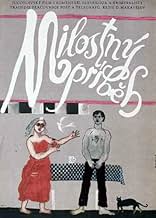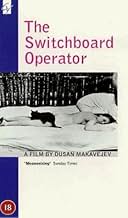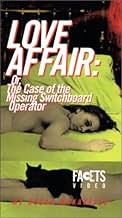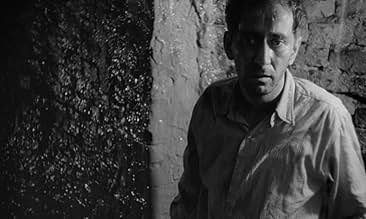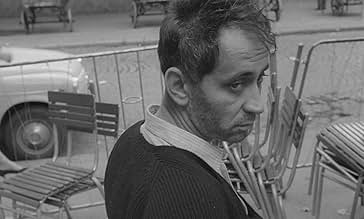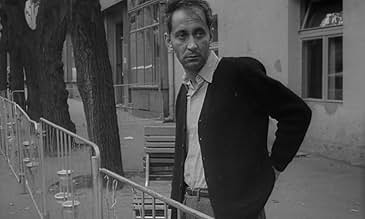Um Caso de Amor (ou) A Tragédia de uma Telefonista
Título original: Ljubavni slucaj ili tragedija sluzbenice P.T.T.
AVALIAÇÃO DA IMDb
7,3/10
2 mil
SUA AVALIAÇÃO
Adicionar um enredo no seu idiomaA young female starts a love relationship with a serious young man. However, while he is away on business, she gets lonely and succumbs to her colleague's desires.A young female starts a love relationship with a serious young man. However, while he is away on business, she gets lonely and succumbs to her colleague's desires.A young female starts a love relationship with a serious young man. However, while he is away on business, she gets lonely and succumbs to her colleague's desires.
- Direção
- Roteiristas
- Artistas
Aleksander Kostic
- Ekspert za seksualna pitanja
- (as Dr Aleksandar Dj Kostic)
Zivojin Aleksic
- Ekspert za kriminalistiku
- (as Dr Zivojin L Aleksic)
Dragan Obradovic
- Obducent
- (as Dr Dragan Obradovic)
- Direção
- Roteiristas
- Elenco e equipe completos
- Produção, bilheteria e muito mais no IMDbPro
Avaliações em destaque
10dragokin
The combination of almost documentary approach with non-linear storytelling makes Love Affair arguably Makavejev's finest work.
The documentary approach, including a lot of archive footage, echoes Innocence Unprotected (Nevinost bez zatite) as we follow common people during what turned out to be socialism's heyday in former Yugoslavia.
Non-linear storytelling has later been driven to the excess in WR: Mysteries of Organism (WR: Misterije organizma) rendering Love Affair much more accessible.
This must have been an extraordinary movie at the time, along with rather brave Eva Ras in one of the lead roles.
The documentary approach, including a lot of archive footage, echoes Innocence Unprotected (Nevinost bez zatite) as we follow common people during what turned out to be socialism's heyday in former Yugoslavia.
Non-linear storytelling has later been driven to the excess in WR: Mysteries of Organism (WR: Misterije organizma) rendering Love Affair much more accessible.
This must have been an extraordinary movie at the time, along with rather brave Eva Ras in one of the lead roles.
Dusan Makavejev is probably not a name that most people will recognize, but film buffs should. In the late '60s he was part of a wave of Yugoslav filmmakers who changed the face of that country's cinema (much like Mike Nichols in the US) in what got called the Black Wave. Since lots of people in the US only learned of Yugoslavia from the horrors of the 1990s war in Bosnia, it might surprise them that the country had a thriving film industry for a long time.
Anyway, Makavejev's "Ljubavni slucaj ili tragedija sluzbenice P. T. T." ("Love Affair, or the Case of the Missing Switchboard Operator" in English) tells of a romance between a switchboard operator and a sanitation inspector. I figure that the movie must've been hard to make, given some of the explicit scenes. But more important is the point that the movie makes about relationships, and it doesn't hold back.
Like "Carnal Knowledge" and "Portnoy's Complaint", this movie shows that relationships are bound to come with complications. I recommend it to everyone.
Anyway, Makavejev's "Ljubavni slucaj ili tragedija sluzbenice P. T. T." ("Love Affair, or the Case of the Missing Switchboard Operator" in English) tells of a romance between a switchboard operator and a sanitation inspector. I figure that the movie must've been hard to make, given some of the explicit scenes. But more important is the point that the movie makes about relationships, and it doesn't hold back.
Like "Carnal Knowledge" and "Portnoy's Complaint", this movie shows that relationships are bound to come with complications. I recommend it to everyone.
What I enjoyed most about this inexplicable Yugoslavian film was the source of pleasure in watching a movie filmed on grainy, imprecise celluloid stock. Every scene hums with that lovely old-fashioned atmosphere of maddeningly strenuous traditional film-making. We can sense the boom mikes, the film reel, the guys with big, uncomfortable headphones, and the director with a big vision that frustrates him by communication breakdown, as the outcome of his film is a bewilderingly ambiguous celluloid mishmash of sex, young lovers, totalitarian Yugoslavia, and nonlinear narrative structure.
And as such, it is a joy! It splurges and has fun! In one hour and nine minutes, its main thread, concerning a Hungarian switchboard operator who meets and falls in love with a Muslim who soon moves into her apartment much to the jealous chagrin of an imposing postal worker, intruding some touching intercuts of archive footage that give impressions of lives ensnared in totalitarian society, a brief history of how the gray rat infested Europe, and a sexologist in his study talking about the history of sex. Even the central train of thought is deconstructed into ambiguity as, seemingly at the same time, the police are investigating the drowning of a young woman.
Director Dusan Makavejev seems to have simply made a multi-faceted montage of Yugoslavia and reflections based on its time, 1967. In spite of its self-indulgence, as was a common limitation of progressive European art-house films of the time, it is very enjoyable.
And as such, it is a joy! It splurges and has fun! In one hour and nine minutes, its main thread, concerning a Hungarian switchboard operator who meets and falls in love with a Muslim who soon moves into her apartment much to the jealous chagrin of an imposing postal worker, intruding some touching intercuts of archive footage that give impressions of lives ensnared in totalitarian society, a brief history of how the gray rat infested Europe, and a sexologist in his study talking about the history of sex. Even the central train of thought is deconstructed into ambiguity as, seemingly at the same time, the police are investigating the drowning of a young woman.
Director Dusan Makavejev seems to have simply made a multi-faceted montage of Yugoslavia and reflections based on its time, 1967. In spite of its self-indulgence, as was a common limitation of progressive European art-house films of the time, it is very enjoyable.
To the newcomer, especially to a work like Love Affair or The Case of the Missing Switchboard Operator, it might appear that the filmmaker Dusan Makavejev has attention deficit disorder. The guy isn't interested in stories like your Pappy filmmaker John Ford was. He comes from a country that has been through the war and revolution, but he's well aware of what the moving image can give to the intended (or unintended) viewer. His style goes from one thing to another in a snap, without fair warning. This is why, perhaps, the best entry point into his career is the scandalous, hilarious politi-sex docu-drama-comedy WR The Mysteries of the Organism. Once you get through that, and you want more, you can go on to his earlier works such as this one.
In a way it's similar to WR in that it tells a very conventional, some would say uber-melodrama, story of a average-but-pretty switchboard operator who meets a rodent-catcher (aka sanitation worker) and they have a love affair. It has this, but Makavejev also cuts in clips from a sex doctor espousing about the nature of sex and phalluses in art, and how an egg is more than "just an omelet" and faces the audience directly with this. And, on top of this, we get every so often a fact about rodent over-populations and some political imagery and workers marching the in the street for good measure. For the filmmaker, this story of a girl and a man having a fling, mostly happy and only sad towards the end of their affair, when an unintentional betrayal occurs on the part of the girl, is just part of the woodwork, and we can take what we will what it means in context of rodents and sex... or a murder mystery for that matter.
Some of the film is amusing in its sudden movements and cutaways. Take the scene where Isabella is trying to work late and the guy that runs the switchboard keeps teasing her sexually, trying to have his way. She finally gives in, very reluctantly, and we see her face is devastated. Immediately this cuts to a very scratchy-grainy film stock showing "Adam and Eve", a naked man and woman, in a circling movement in various sculpture-like poses. What does this mean? Why does Makavejev throw this in here? Perhaps as a practical joke, or as one of those self-conscious beats akin to Godard. But for him, it could mean everything or nothing. We get some blatant nudity, but none of the sex is too graphic; it's about average people, then made non-linear by a (somewhat) average murder case, and then made extraordinary by its editing style and fresh outlook on Yugoslavian love and work.
In other words, expect a free-wheeling film that mixes real romance and satire, real documentary footage and breaking-the-fourth wall, melodrama and tragedy. It's not always exciting, and a little rough around the edges. For even the somewhat-fan of the director's, it's an anarchic treat.
In a way it's similar to WR in that it tells a very conventional, some would say uber-melodrama, story of a average-but-pretty switchboard operator who meets a rodent-catcher (aka sanitation worker) and they have a love affair. It has this, but Makavejev also cuts in clips from a sex doctor espousing about the nature of sex and phalluses in art, and how an egg is more than "just an omelet" and faces the audience directly with this. And, on top of this, we get every so often a fact about rodent over-populations and some political imagery and workers marching the in the street for good measure. For the filmmaker, this story of a girl and a man having a fling, mostly happy and only sad towards the end of their affair, when an unintentional betrayal occurs on the part of the girl, is just part of the woodwork, and we can take what we will what it means in context of rodents and sex... or a murder mystery for that matter.
Some of the film is amusing in its sudden movements and cutaways. Take the scene where Isabella is trying to work late and the guy that runs the switchboard keeps teasing her sexually, trying to have his way. She finally gives in, very reluctantly, and we see her face is devastated. Immediately this cuts to a very scratchy-grainy film stock showing "Adam and Eve", a naked man and woman, in a circling movement in various sculpture-like poses. What does this mean? Why does Makavejev throw this in here? Perhaps as a practical joke, or as one of those self-conscious beats akin to Godard. But for him, it could mean everything or nothing. We get some blatant nudity, but none of the sex is too graphic; it's about average people, then made non-linear by a (somewhat) average murder case, and then made extraordinary by its editing style and fresh outlook on Yugoslavian love and work.
In other words, expect a free-wheeling film that mixes real romance and satire, real documentary footage and breaking-the-fourth wall, melodrama and tragedy. It's not always exciting, and a little rough around the edges. For even the somewhat-fan of the director's, it's an anarchic treat.
This is not only a great little movie, but also a great time-capsule of late-'60s Yugoslavia (a nation since destroyed by way of violent imperialist intervention).
A young Hungarian woman and an older, Serbian man enter into a relationship under the internationalist, multi-ethnic, mid-twentieth century culture of communist Yugoslavia. This work contains scenes of beautiful, deeply moving, intimacy and sexuality.
The contradictions of this culture are made plain within the movie by reference to scenes from a Russian revolutionary film by Dziga Vertoz: Committed communist masses dismantle an old Cathedral- their cause is clearly popular and democratic, yet it is intolerant of an institution that has itself embodied intolerance for millennia. "Revolutionary", "scientific" humanity remains constellated within a dialectic of resentment.
Ultimately, human frailty destroys both the Hungarian and the Serbian. Misunderstanding and jealousy cause the lovers to turn on, and destroy, each other within the the terms set forth by this "revolutionary" society. Progress creates the illusion of enlightenment. But ultimately it is human nature that decides our fate.
This outlook ultimately qualifies writer-director Dusan Makavejev as a philosophical reactionary, albeit an exceptionally creative one.
A young Hungarian woman and an older, Serbian man enter into a relationship under the internationalist, multi-ethnic, mid-twentieth century culture of communist Yugoslavia. This work contains scenes of beautiful, deeply moving, intimacy and sexuality.
The contradictions of this culture are made plain within the movie by reference to scenes from a Russian revolutionary film by Dziga Vertoz: Committed communist masses dismantle an old Cathedral- their cause is clearly popular and democratic, yet it is intolerant of an institution that has itself embodied intolerance for millennia. "Revolutionary", "scientific" humanity remains constellated within a dialectic of resentment.
Ultimately, human frailty destroys both the Hungarian and the Serbian. Misunderstanding and jealousy cause the lovers to turn on, and destroy, each other within the the terms set forth by this "revolutionary" society. Progress creates the illusion of enlightenment. But ultimately it is human nature that decides our fate.
This outlook ultimately qualifies writer-director Dusan Makavejev as a philosophical reactionary, albeit an exceptionally creative one.
Você sabia?
- CuriosidadesThe film was initially refused a UK certificate by the BBFC owing to shots of pubic hair, though the distributor himself partly ruined its chances by ignoring the film's creative aspects and instead telling censor John Trevelyan "I am sending you a film with a few tits in it. I don't think much of it but I can sell it to the sex theaters". It was eventually passed with minor cuts in 1969 and released fully uncut on video in 1996.
- ConexõesFeatured in Zabranjeni bez zabrane (2007)
Principais escolhas
Faça login para avaliar e ver a lista de recomendações personalizadas
- How long is Love Affair, or The Case of the Missing Switchboard Operator?Fornecido pela Alexa
Detalhes
- Tempo de duração
- 1 h 19 min(79 min)
- Cor
- Mixagem de som
- Proporção
- 1.66 : 1
Contribua para esta página
Sugerir uma alteração ou adicionar conteúdo ausente

